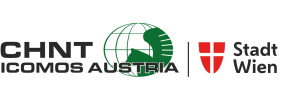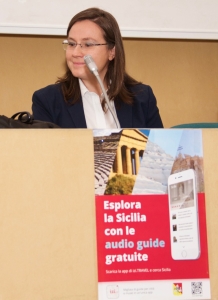Keynote & Workshop on Digital Storytelling
We are using today’s blog to introduce Elisa Bonacini. She will give a keynote speech on Thursday, November 16 and organise a workshop on Friday, November 17 at CHNT28.
Elisa Bonacini is an archaeologist and a digital museologist. She is a specialized in cultural communication with new technologies, theme on which she published monographs and scientific articles.
She worked as chief of communication at the International Puppets Museum in Palermo and as consultant on cultural heritage dissemination and enhancement through new technologies and storytelling participatory projects through heritage communities. She is currently Researcher in Museology at the University of Bari, on a project named Museums – back to the future.
Since 2013 to 2018 she was the regional coordinator and one of the founders of the #InvasioniDigitali project and, since 2016, the coordinator for the participatory and co-creative project named #iziTRAVELSicilia, by coordinating the publication of hundreds of multimedia audio guides on the free global platform izi.TRAVEL. First main aim of this project was to bridge the gap of digital communication and enhancement of Sicilian cultural heritage through izi.TRAVEL, a free digital storytelling platform and app, and participatory and co-creative processes with local stakeholders. By involving thousands of people and hundreds of institutions, representing the “heritage communities” cited by the Faro Convention, #iziTRAVELSicilia has been soon transformed into a participatory process and a best practice. More than 400 audio-guides have been created.
As used in this pilot project, izi.TRAVEL could be used accorting to a practical, replicable, and scalable workflow, thanks to which institutions can implement these forms of co-creative engagement, to digitally enhance their heritage and attractions, by using this innovative tool for stimulating emotional and creative involvement of people in the co-creation of cultural digital content and stories.
In a museum approach profoundly changed and oriented towards a modernization of languages and contents, digital storytelling also appears to be an excellent tool to engage the public, with an attention in participation of communities to co-production and co-creation of content. According to her research, the workshop “How to connect heritage and public through digital storytelling” aims to introduce forms, languages and functions of digital storytelling applied both to the communication and enhancement of tangible and intangible cultural heritage. It addresses the meaning and role that storytelling has today in cultural and tourism marketing as a tool for dissemination, enhancement, and promotion of cultural heritage, also for tourism purposes. In particular, the 14 “forms” with which digital storytelling can be produced and used today, from podcasts to transmedia storytelling, will be explored.
In fact, she will focus on the use of participatory digital storytelling in cultural and museum education, highlighting on one hand the bidirectional relationship that heritage communities can carry out by supporting the institutions in co-creation processes, on the other one the benefits that participatory storytelling projects can produce in the involved heritage communities.
Finally, Elisa proposed a new vision of museum (the “Museum of Connection” model) which, starting from the antique and nineteenth-century vision of the collection museum comes to what has wanted to define a connection museum or connected narration.
Elisa Bonacini
…had a first BA in Classics and a second one in Enhancement of Archaeological Heritage; she is specialized in Classical Archaeology. She had a first PhD in Humanities and Cultural Heritage and was a 2-year Research Fellow in the Humanities Department of the University of Catania about Digital Enhancement of Cultural Heritage. She has a secondo PhD at the University of Cordoba about “Digital storytelling as a teaching tool for transmission and cultural enhancement”. She is currently Researcher in Museology at the University of Bari, within the European project “Cultural Heritage Active Innovation for Sustainable Society – CHANGES” project code n. PE00000020 – CUP: H53C22000860006 on the theme “Museums back to the future”.




